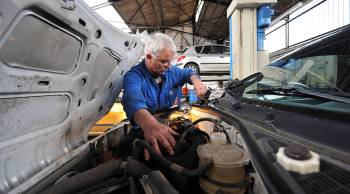
Multigenerational households make good economic sense

The coronavirus pandemic is accelerating another major transition: the shift toward the multigenerational household. How do Americans feel about grandparents, parents and children all living together under one roof? And are perceptions of this changing in what could be a long-term shift?
Marketplace senior economics contributor Chris Farrell joined “Marketplace Morning Report” host David Brancaccio to discuss this. The following is an edited transcript of their conversation.
David Brancaccio: All right, adult kids with parents, parents with grandparents, under one roof. How common?
Chris Farrell: The numbers are striking. The most recent numbers we have is 20% of the American population is living in this multigenerational household. And that’s up from a low of 12% in 1980. So this living arrangement, it’s moving from society’s tributaries to the mainstream.
Brancaccio: We covered this during the last recession: the adult kids in the basement or the attic, that was seen as kind of sad for both the parental units and the offspring.
Farrell: Yeah, the tales of the “Boomerang Generation,” or “Generation Y Bother to Move Out of the House.” I mean, these were really disturbing fallout stories from the Great Recession. But this commonplace discussion about generational dependency made it sound like the trend would pass when the recession ended. But the numbers kept rising, David, so the multigenerational home is a safety net, yes. But the bigger story is the compelling economics of multiple generations living under one roof.
Brancaccio: All right, the bright side, the compelling part. I mean, I guess the kids could share out some child care situation with the parents in return for cooking, or, in my case, fixing the Wi-Fi router. That’s what I would contribute.
Farrell: Absolutely. And then as the parents get older, it makes elder care a lot easier. And because, look, the United States stands out — we don’t have a national caregiving system. So people are creating their own system.
And the other thing is, this economy has produced too few good-paying jobs in recent decades. So it makes sense for families, extended families, to pool resources to own and maintain a home. Plus, this long-term trend toward rising immigration in the United States, well, immigrants tend to live in multigenerational homes. You take it all together, David, and it’s a major trend.
Brancaccio: Right, and pandemic accelerates the trend?
Farrell: Absolutely. I mean, for one thing, none of the underlying economics has changed because of the pandemic. But what’s more, the high death toll in these congregate living facilities — you know, nursing homes, assisted living centers, continuing care communities — it’s pushed many families to want to keep their aging loved ones at home for a longer period of time. And too many families watch their aging parents be lonely in these congregate living facilities. So the desire to live together is strong.
There’s a lot happening in the world. Through it all, Marketplace is here for you.
You rely on Marketplace to break down the world’s events and tell you how it affects you in a fact-based, approachable way. We rely on your financial support to keep making that possible.
Your donation today powers the independent journalism that you rely on. For just $5/month, you can help sustain Marketplace so we can keep reporting on the things that matter to you.

















